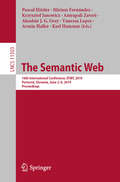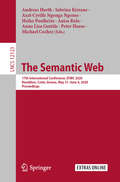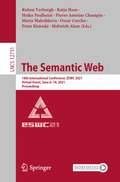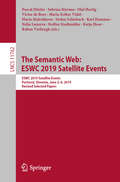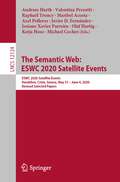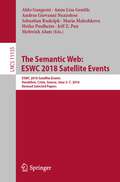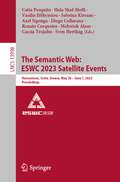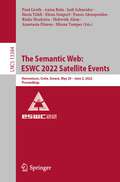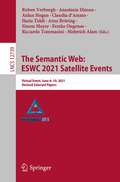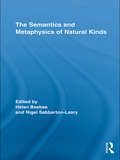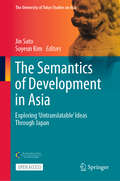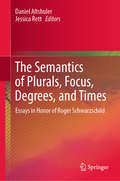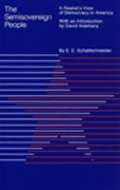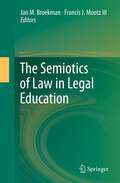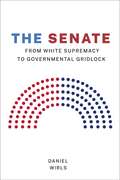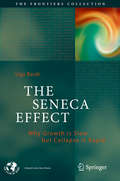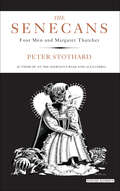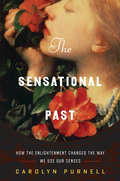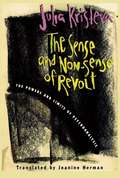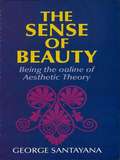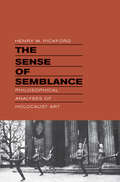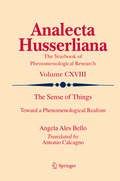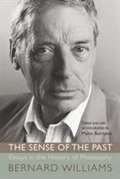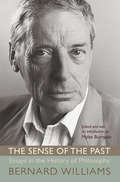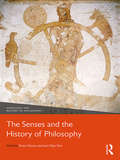- Table View
- List View
The Semantic Web: 16th International Conference, ESWC 2019, Portorož, Slovenia, June 2–6, 2019, Proceedings (Lecture Notes in Computer Science #11503)
by Armin Haller Pascal Hitzler Miriam Fernández Krzysztof Janowicz Amrapali Zaveri Alasdair J. G. Gray Vanessa Lopez Karl HammarThis book constitutes the refereed proceedings of the 16th International Semantic Web Conference, ESWC 2019, held in Portorož, Slovenia. The 39 revised full papers presented were carefully reviewed and selected from 134 submissions. The papers are organized in three tracks: research track, resources track, and in-use track and deal with the following topical areas: distribution and decentralisation, velocity on the Web, research of research, ontologies and reasoning, linked data, natural language processing and information retrieval, semantic data management and data infrastructures, social and human aspects of the Semantic Web, and, machine learning.
The Semantic Web: 17th International Conference, ESWC 2020, Heraklion, Crete, Greece, May 31–June 4, 2020, Proceedings (Lecture Notes in Computer Science #12123)
by Heiko Paulheim Axel-Cyrille Ngonga Ngomo Anna Lisa Gentile Sabrina Kirrane Andreas Harth Anisa Rula Peter Haase Michael CochezThis book constitutes the refereed proceedings of the 17th International Semantic Web Conference, ESWC 2020, held in Heraklion, Crete, Greece.* The 39 revised full papers presented were carefully reviewed and selected from 166 submissions. The papers were submitted to three tracks: the research track, the resource track and the in-use track. These tracks showcase research and development activities, services and applications, and innovative research outcomes making their way into industry. The research track caters for both long standing and emerging research topics in the form of the following subtracks: ontologies and reasoning; natural language processing and information retrieval; semantic data management and data infrastructures; social and human aspects of the Semantic Web; machine learning; distribution and decentralization; science of science; security, privacy, licensing and trust; knowledge graphs; and integration, services and APIs.*The conference was held virtually due to the COVID-19 pandemic.Chapter ‘Piveau: A Large-scale Oopen Data Management Platform based on Semantic Web Technologies’ is available open access under a Creative Commons Attribution 4.0 International License via link.springer.com.
The Semantic Web: 18th International Conference, ESWC 2021, Virtual Event, June 6–10, 2021, Proceedings (Lecture Notes in Computer Science #12731)
by Ruben Verborgh Oscar Corcho Heiko Paulheim Katja Hose Mehwish Alam Maria Maleshkova Pierre-Antoine Champin Petar RistoskiThis book constitutes the refereed proceedings of the 18th International Semantic Web Conference, ESWC 2021, held virtually in June 2021. The 41 full papers and 2 short papers presented were carefully reviewed and selected from 167 submissions. The papers were submitted to three tracks: the research track, the resource track and the in-use track. These tracks showcase research and development activities, services and applications, and innovative research outcomes making their way into industry. The research track caters to both long-standing and emerging research topics in the form of the following subtracks: ontologies and reasoning; knowledge graphs (understanding, creating, and exploiting); semantic data management, querying and distributed data; data dynamics, quality, and trust; matching, integration, and fusion; NLP and information retrieval; machine learning; science data and scholarly communication; and problems to solve before you die.
The Semantic Web: ESWC 2019 Satellite Events, Portorož, Slovenia, June 2–6, 2019, Revised Selected Papers (Lecture Notes in Computer Science #11762)
by Ruben Verborgh Maria-Esther Vidal Stefan Schlobach Pascal Hitzler Olaf Hartig Katja Hose Maria Maleshkova Karl Hammar Sabrina Kirrane Victor De Boer Nelia Lasierra Steffen StadtmüllerThis book constitutes the thoroughly refereed post-conference proceedings of the Satellite Events of the 16th Extended Semantic Web Conference, ESWC 2019, held in Portorož, Slovenia, in June 2019.The volume contains 38 poster and demonstration papers, 2 workshop papers,5 PhD symposium papers, and 3 industry track papers, selected out of a total of 68 submissions. They deal with all areas of semantic web research, semantic technologies on the Web and Linked Data.
The Semantic Web: ESWC 2020 Satellite Events, Heraklion, Crete, Greece, May 31 – June 4, 2020, Revised Selected Papers (Lecture Notes in Computer Science #12124)
by Valentina Presutti Raphaël Troncy Olaf Hartig Katja Hose Maribel Acosta Andreas Harth Michael Cochez Axel Polleres Javier D. Fernández Josiane Xavier ParreiraThis book constitutes the proceedings of the satellite events held at the 17th Extended Semantic Web Conference, ESWC 2020, in May/June 2020. The conference was planned to take place in Heraklion, Crete, Greece, but changed to an online format due to the COVID-19 pandemic. ESWC is a major venue for presenting and discussing the latest scientific results and technology innovations related to the Semantic Web, Linked Data and Knowledge Graphs. The 36 poster and demo papers, 7 PhD symposium papers, and 4 industry track papers, included in this volume were carefully reviewed and selected from 59 submissions to the poster and demo track; 11 submissions to the PhD symposium track, and 5 submissions to the Industry track.
The Semantic Web: Eswc 2018 Satellite Events, Heraklion, Crete, Greece, June 3-7, 2018, Revised Selected Papers (Lecture Notes in Computer Science #11155)
by Heiko Paulheim Sebastian Rudolph Aldo Gangemi Mehwish Alam Anna Lisa Gentile Andrea Giovanni Nuzzolese Maria Maleshkova Jeff Z PanThis book constitutes the thoroughly refereed post-conference proceedings of the Satellite Events of the 15th Extended Semantic Web Conference, ESWC 2018, held in Heraklion, Crete, Greece, in June 2018.The volume contains 41 poster and demonstration papers, 11 invited workshop papers, and 9 full papers, selected out of a total of 70 submissions. They deal with all areas of semantic web research, semantic technologies on the Web and Linked Data.
The Semantic Web: Hersonissos, Crete, Greece, May 28 - June 1, 2023, Proceedings (Lecture Notes in Computer Science #13998)
by Mehwish Alam Sabrina Kirrane Vasilis Efthymiou Catia Pesquita Hala Skaf-Molli Renato Cerqueira Sven Hertling Axel Ngonga Diego Collarana Cassia TrojahnThis book constitutes the post-conference proceedings of the satellite events held at the 20th Extended Semantic Web Conference, ESWC 2023, held in Hersonissos, Greece, during May 28—June 1, 2023.The 50 full papers included in this book were carefully reviewed and selected from 109 submissions. They were organized in sections as follows: Posters and Demos, Industry, and PhD Symposium.
The Semantic Web: Hersonissos, Crete, Greece, May 29 – June 2, 2022, Proceedings (Lecture Notes in Computer Science #13384)
by Paul Groth Elena Simperl Rinke Hoekstra Mehwish Alam Anisa Rula Panos Alexopoulos Anastasia Dimou Ilaria Tiddi Jodi Schneider Minna TamperThis book constitutes the proceedings of the satellite events held at the 19th Extended Semantic Web Conference, ESWC 2022, during May—June in Hersonissos, Greece, 2022. The included satellite events are: the poster and demo session; the PhD symposium; industry track; project networking; workshops and tutorials. During ESWC 2022, the following ten workshops took place:10th Linked Data in Architecture and Construction Workshop (LDAC 2022); 5th International Workshop on Geospatial Linked Data (GeoLD 2022); 5th Workshop on Semantic Web solutions for large-scale biomedical data analytics (SeMWeBMeDA 2022); 7th Natural Language Interfaces for the Web of Data (NLIWOD+QALD 2022); International Workshop on Knowledge Graph Generation from Text (Text2KG 2022); 3rd International Workshop on Deep Learning meets Ontologies and Natural Language Processing (DeepOntoNLP 2022); 1st Workshop on Modular Knowledge (ModularK 2022); Third International Workshop On Knowledge Graph Construction (KGCW 2022); Third International Workshop On Semantic Digital Twins (SeDIT 2022); and the 1st International Workshop on Semantic Industrial Information Modelling (SemIIM 2022).
The Semantic Web: Virtual Event, June 6–10, 2021, Revised Selected Papers (Lecture Notes in Computer Science #12739)
by Ruben Verborgh Mehwish Alam Simon Maier Claudia D’Amato Aidan Hogan Anastasia Dimou Ilaria Tiddi Arne Bröring Femke Ongenae Riccardo TommasiniThis book constitutes the proceedings of the satellite events held at the 18th Extended Semantic Web Conference, ESWC 2021, in June 2021. The conference was held online, due to the COVID-19 pandemic.During ESWC 2021, the following six workshops took place: 1) the Second International Workshop on Deep Learning meets Ontologies and Natural Language Processing (DeepOntoNLP 2021) 2) the Second International Workshop on Semantic Digital Twins (SeDiT 2021) 3) the Second International Workshop on Knowledge Graph Construction (KGC 2021) 5) the 6th International Workshop on eXplainable SENTIment Mining and EmotioN deTection (X-SENTIMENT 2021) 6) the 4th International Workshop on Geospatial Linked Data (GeoLD 2021).
The Semantics and Metaphysics of Natural Kinds (Routledge Studies In Metaphysics Ser. #1)
by Helen BeebeeEssentialism--roughly, the view that natural kinds have discrete essences, generating truths that are necessary but knowable only a posteriori--is an increasingly popular view in the metaphysics of science. At the same time, philosophers of language have been subjecting Kripke’s views about the existence and scope of the necessary a posteriori to rigorous analysis and criticism. Essentialists typically appeal to Kripkean semantics to motivate their radical extension of the realm of the necessary a posteriori; but they rarely attempt to provide any semantic arguments for this extension, or engage with the critical work being done by philosophers of language. This collection brings authors on both sides together in one volume, thus helping the reader to see the connections between views in philosophy of language on the one hand and the metaphysics of science on the other. The result is a book that will have a significant impact on the debate about essentialism, encouraging essentialists to engage with debates about the semantic presuppositions that underpin their position, and, encouraging philosophers of language to engage with the metaphysical presuppositions enshrined in Kripkean semantics.
The Semantics of Development in Asia: Exploring ‘Untranslatable’ Ideas Through Japan (The University of Tokyo Studies on Asia)
by Jin Sato Soyeun KimThis open access book explores Japanese involvement in Asian development through selected development ideas and lexemes that are widely regarded in Japan as 'untranslatable' into other languages. Each chapter traces the genealogy of locally nuanced development ideas and lexemes in Japan and the process by which they have spread across Asia and beyond through Japan's development cooperation. The Semantics of Development in Asia critically examines the diverse (Western and non-Western) roots of Japanese development ideas and lexemes and their shifting semantics, shaped by the ever-changing national/international political economies and dominant development thinking of different eras. The volume contributes to a more pluriversal approach to knowledge production in development studies through its in-depth examination of vernacular Japanese ideas. This book is useful to researchers, students and teachers in the fields of Asian studies, development studies andinternational relations. It is also of value to policymakers and practitioners whose professional interests include development cooperation by, and with, Asian countries.
The Semantics of Plurals, Focus, Degrees, and Times: Essays in Honor of Roger Schwarzschild
by Daniel Altshuler Jessica RettThis volume is a tribute to Roger Schwarzschild's immense contributions in the formal semantics of nouns, focus, degrees and space, and tense and aspect. Collectively, the papers in the volume reveal parallels across ontological domains, in particular in the context of elements with internal structure, like plural sets, alternative sets, degree intervals, temporal intervals, and vectors. This research suggests that the structure of an entity could inform the semantic behavior of that entity just as much (if not more) than its semantic type or lexical category. And because these structures dictate the formation of semantic alternatives, it can help inform focus semantics and scalar implicature as well. Old questions on plurals, focus and degree expressions get new answers in this collection of papers in honor of Roger Schwarzchild. Roger Schwarzschild is one of the leading scholars in semantics, and the editors have been highly successful in requesting contributions by his teachers, peers and former students. Some papers have circulated in draft form for many years, and find their final home in this edited volume, which well reflects the state of the art in the field. Prof. dr. Henriëtte de Swart, Utrecht University, The Netherlands
The Semi-Sovereign People: A Realist's View of Democracy In America
by Elmer E. SchattschneiderThis book started out to be an attempt to formulate a theory of political organization. The assumption made throughout is that the nature of political organization depends on the conflicts exploited in the political system, which ultimately is what politics is about. The thesis is that we shall never understand politics unless we know what the struggle is about.
The Semiotics of Law in Legal Education
by Jan M. Broekman Francis J. Mootz IIIThis book offers educational experiences, including reflections and the resulting essays, from the Roberta Kevelson Seminar on Law and Semiotics held during 2008 - 2011 at Penn State University's Dickinson School of Law. The texts address educational aspects of law that require attention and that also are issues in traditional jurisprudence and legal theory. The book introduces education in legal semiotics as it evolves in a legal curriculum. Specific semiotic concepts, such as "sign", "symbol" or "legal language," demonstrate how a lawyer's professionally important tasks of name-giving and meaning-giving are seldom completely understood by lawyers or laypeople. These concepts require analyses of considerable depth to understand the expressiveness of these legal names and meanings, and to understand how lawyers can "say the law," or urge such a saying correctly and effectively in the context of a natural language that is understandable to all of us. The book brings together the structure of the Seminar, its foundational philosophical problems, the specifics of legal history, and the semiotics of the legal system with specific themes such as gender, family law, and business law.
The Senate: From White Supremacy to Governmental Gridlock (Constitutionalism and Democracy)
by Daniel WirlsIn this lively analysis, Daniel Wirls examines the Senate in relation to our other institutions of government and the constitutional system as a whole, exposing the role of the "world’s greatest deliberative body" in undermining effective government and maintaining white supremacy in America.As Wirls argues, from the founding era onward, the Senate constructed for itself an exceptional role in the American system of government that has no firm basis in the Constitution. This self-proclaimed exceptional status is part and parcel of the Senate’s problematic role in the governmental process over the past two centuries, a role shaped primarily by the combination of equal representation among states and the filibuster, which set up the Senate’s clash with modern democracy and effective government and has contributed to the contemporary underrepresentation of minority members. As he explains, the Senate’s architecture, self-conception, and resulting behavior distort rather than complement democratic governance and explain the current gridlock in Washington, D.C. If constitutional changes to our institutions are necessary for better governance, then how should the Senate be altered to be part of the solution rather than part of the problem? This book provides one answer.
The Seneca Effect
by Ugo BardiThe essence of this book can be found in a line written by the ancient Roman Stoic Philosopher Lucius Annaeus Seneca: "Fortune is of sluggish growth, but ruin is rapid". This sentence summarizes the features of the phenomenon that we call "collapse," which is typically sudden and often unexpected, like the proverbial "house of cards. " But why are such collapses so common, and what generates them? Several books have been published on the subject, including the well known "Collapse" by Jared Diamond (2005), "The collapse of complex societies" by Joseph Tainter (1998) and "The Tipping Point," by Malcom Gladwell (2000). Why The Seneca Effect? This book is an ambitious attempt to pull these various strands together by describing collapse from a multi-disciplinary viewpoint. The reader will discover how collapse is a collective phenomenon that occurs in what we call today "complex systems," with a special emphasis on system dynamics and the concept of "feedback. " From this foundation, Bardi applies the theory to real-world systems, from the mechanics of fracture and the collapse of large structures to financial collapses, famines and population collapses, the fall of entire civilzations, and the most dreadful collapse we can imagine: that of the planetary ecosystem generated by overexploitation and climate change. The final objective of the book is to describe a conclusion that the ancient stoic philosophers had already discovered long ago, but that modern system science has rediscovered today. If you want to avoid collapse you need to embrace change, not fight it. Neither a book about doom and gloom nor a cornucopianist's dream, The Seneca Effect goes to the heart of the challenges that we are facing today, helping us to manage our future rather than be managed by it.
The Senecans: Four Men and Margaret Thatcher
by Peter Stothard“This unconventional account of the Margaret Thatcher years by a former editor of the Times . . . mixes reminiscence, gossip, and classical philosophy.” —The New YorkerA year after the death of Margaret Thatcher, a young historian arrives to ask Peter Stothard, Editor of the Times Literary Supplement and former editor of the Times, some sharp questions about his memories of the Thatcher era. During the interview the offices from where he long observed British politics are being systematically flattened by wrecking balls. From the dust and destruction of a collapsing newspaper plant emerge portraits of the Senecans, four of the men who made the Thatcher court so different from that of her successors. As well as love of Britain’s first female Prime Minister they shared strange Latin lessons in a crumbling riverside bar. They took their name from their taste for the work of Lucius Annaeus Seneca, a pioneer writer from Cordoba in Roman Spain, a philosopher, courtier and acquirer of massive wealth from the age of the Emperor Nero. Blending memoir with ancient and modern politics in the manner of his acclaimed diaries, Spartacus Road and Alexandria, Peter Stothard sheds a sideways light on Margaret Thatcher’s “believing age.” In finally identifying his interviewer he also answers questions about his own literary and political journey.“[An] artful blend of truth and fiction . . . Stothard’s poetically written, supremely stylish memoir only partly conceals its underlying mission, to insist that antiquity still has urgent things to tell us.” —Emily Gowers, The Guardian“This thoughtful and unexpectedly moving memoir . . . brilliantly captures the excitement of the Thatcher years.” —Richard Aldous, The Wall Street Journal
The Sensational Past: How the Enlightenment Changed the Way We Use Our Senses
by Carolyn PurnellSight, smell, hearing, taste, and touch—as they were celebrated during the Enlightenment and as they are perceived today. Blindfolding children from birth? Playing a piano made of live cats? Using tobacco to cure drowning? Wearing “flea”-colored clothes? These actions may seem odd to us, but in the eighteenth century, they made perfect sense. As often as we use our senses, we rarely stop to think about their place in history. But perception is not dependent on the body alone. Carolyn Purnell persuasively shows that, while our bodies may not change dramatically, the way we think about the senses and put them to use has been rather different over the ages. Journeying through the past three hundred years, Purnell explores how people used their senses in ways that might shock us now. And perhaps more surprisingly, she shows how many of our own ways of life are a legacy of this earlier time. The Sensational Past focuses on the ways in which small, peculiar, and seemingly unimportant facts open up new ways of thinking about the past. You will explore the sensory worlds of the Enlightenment, learning how people in the past used their senses, understood their bodies, and experienced the rapidly shifting world around them. In this smart and witty work, Purnell reminds us of the value of daily life and the power of the smallest aspects of existence using culinary history, fashion, medicine, music, and many other aspects of Enlightenment life.
The Sense and Non-Sense of Revolt: The Powers and Limits of Psychoanalysis (European Perspectives: A Series in Social Thought and Cultural Criticism)
by Julia KristevaLinguist, psychoanalyst, and cultural theorist, Julia Kristeva is one of the most influential and prolific thinkers of our time. Her writings have broken new ground in the study of the self, the mind, and the ways in which we communicate through language. Her work is unique in that it skillfully brings together psychoanalytic theory and clinical practice, literature, linguistics, and philosophy.In her latest book on the powers and limits of psychoanalysis, Kristeva focuses on an intriguing new dilemma. Freud and psychoanalysis taught us that rebellion is what guarantees our independence and our creative abilities. But in our contemporary "entertainment" culture, is rebellion still a viable option? Is it still possible to build and embrace a counterculture? For whom—and against what—and under what forms?Kristeva illustrates the advances and impasses of rebel culture through the experiences of three twentieth-century writers: the existentialist John Paul Sartre, the surrealist Louis Aragon, and the theorist Roland Barthes. For Kristeva the rebellions championed by these figures—especially the political and seemingly dogmatic political commitments of Aragon and Sartre—strike the post-Cold War reader with a mixture of fascination and rejection. These theorists, according to Kristeva, are involved in a revolution against accepted notions of identity—of one's relation to others. Kristeva places their accomplishments in the context of other revolutionary movements in art, literature, and politics. The book also offers an illuminating discussion of Freud's groundbreaking work on rebellion, focusing on the symbolic function of patricide in his Totem and Taboo and discussing his often neglected vision of language, and underscoring its complex connection to the revolutionary drive.
The Sense of Beauty: Being the Outline of Aesthetic Theory
by George SantayanaIt is remarkably appropriate that this work on aesthetics should have been written by George Santayana, who is probably the most brilliant philosophic writer and the philosopher with the strongest sense of beauty since Plato. It is not a dry metaphysical treatise, as works on aesthetics so often are, but is itself a fascinating document: as much a revelation of the beauty of language as of the concept of beauty.This unabridged reproduction of the 1896 edition of lectures delivered at Harvard College is a study of "why, when, and how beauty appears, what conditions an object must fulfill to be beautiful, what elements of our nature make us sensible of beauty, and what the relation is between the constitution of the object and the excitement of our susceptibility."Santayana first analyzes the nature of beauty, finding it irrational, "pleasure regarded as the quality of a thing." He then proceeds to the materials of beauty, showing what all human functions can contribute: love, social instincts, senses, etc. Beauty of form is then analyzed, and finally the author discusses the expression of beauty. Literature, religion, values, evil, wit, humor, and the possibility of finite perfection are all examined. Presentation throughout the work is concrete and easy to follow, with examples drawn from art, history, anthropology, psychology, and similar areas.
The Sense of Semblance: Philosophical Analyses of Holocaust Art
by Henry W. PickfordThe Sense of Semblance is the first book to incorporate contemporary analytic philosophy in interpretations of art and architecture, literature, and film about the Holocaust. The book’s principal aim is to move beyond the familiar debates surrounding postmodernism by demonstrating the usefulness of alternative theories of meaning and understanding from the Anglophone analytic tradition. The book takes as its starting point the claim that Holocaust artworks must fulfill at least two specific yet potentially reciprocally countervailing desiderata: they must meet aesthetic criteria (lest they be, say, merely historical documents) and they must meet historical criteria (they must accurately represent the Holocaust, lest they be merely artworks). I locate this problematic within the tradition of philosophical aesthetics, as a version of the conflict between aesthetic autonomy and aesthetic heteronomy, and claim that Theodor W. Adorno’s “dialectic of aesthetic semblance” describes the normative demand that a successful artwork maintain a dynamic tension between these dual desiderata. While working within a framework inspired by Adorno, the book further claims that certain concepts and lines of reasoning from contemporary philosophy best explicate how individual artworks fulfill these dual desiderata, including the causal theory of names, the philosophy of tacit knowledge, analytic philosophy of quotation, Sartre’s theory of the imaginary, work in the epistemology of testimony, and Walter Benjamin’s theory of dialectical images. Individual chapters provide close readings of lyric poetry by Paul Celan (including a critique of Derridean deconstruction), Holocaust memorials in Berlin, texts by the Austrian quotational artist Heimrad Bäcker, Claude Lanzmann’s film Shoah and Art Spiegelman’s graphic novel Maus. The result is a set of interpretations of Holocaust artworks that, in their precision, specificity and clarity, inaugurate a dialogue between contemporary analytic philosophy and contemporary art.
The Sense of Things
by Angela Ales BelloThis book proposes a new interpretative key for reading and overcoming the binary of idealism and realism. It takes as its central issue for exploration the way in which human consciousness unfolds, i. e. , through the relationship between the I and the world--a field of phenomenological investigation that cannot and must not remain closed within the limits of its own disciplinary borders. The book focuses on the question of realism in contemporary debates, ultimately dismantling prejudices and automatisms that one finds therein. It shows that at the root of the controversy between realism and idealism there often lie equivocations of a semantic nature and by going back to the origins of modern phenomenology it puts into play a discussion of the Husserlian concept of transcendental idealism. Following this path and neutralizing the extreme positions of a critical idealism and a naïve realism, the book proposes a "transcendental realism": the horizon of a dynamic unity that embraces the process of cognition and that grounds the relation, and not the subordination, of subject and object. The investigation of this reciprocity allows the surpassing of the limits of the domain of knowing, leading to fundamental questions surrounding the ultimate sense of things and their origin.
The Sense of the Past
by Bernard WilliamsBefore his death in 2003, Bernard Williams planned to publish a collection of historical essays, focusing primarily on the ancient world. This posthumous volume brings together a much wider selection, written over some forty years. His legacy lives on in this masterful work, the first collection ever published of Williams's essays on the history of philosophy. The subjects range from the sixth century B.C. to the twentieth A.D., from Homer to Wittgenstein by way of Socrates, Plato, Aristotle, Descartes, Hume, Sidgwick, Collingwood, and Nietzsche. Often one would be hard put to say which part is history, which philosophy. Both are involved throughout, because this is the history of philosophy written philosophically. Historical exposition goes hand in hand with philosophical scrutiny. Insights into the past counteract blind acceptance of present assumptions. In his touching and illuminating introduction, Myles Burnyeat writes of these essays: "They show a depth of commitment to the history of philosophy seldom to be found nowadays in a thinker so prominent on the contemporary philosophical scene." The result celebrates the interest and importance to philosophy today of its near and distant past. The Sense of the Past is one of three collections of essays by Bernard Williams published by Princeton University Press since his death. In the Beginning Was the Deed: Realism and Moralism in Political Argument, selected, edited, and with an introduction by Geoffrey Hawthorn, and Philosophy as a Humanistic Discipline, selected, edited, and with an introduction by A. W. Moore, make up the trio.
The Sense of the Past: Essays in the History of Philosophy
by Bernard WilliamsBefore his death in 2003, Bernard Williams planned to publish a collection of historical essays, focusing primarily on the ancient world. This posthumous volume brings together a much wider selection, written over some forty years. His legacy lives on in this masterful work, the first collection ever published of Williams's essays on the history of philosophy. The subjects range from the sixth century B.C. to the twentieth A.D., from Homer to Wittgenstein by way of Socrates, Plato, Aristotle, Descartes, Hume, Sidgwick, Collingwood, and Nietzsche. Often one would be hard put to say which part is history, which philosophy. Both are involved throughout, because this is the history of philosophy written philosophically. Historical exposition goes hand in hand with philosophical scrutiny. Insights into the past counteract blind acceptance of present assumptions. In his touching and illuminating introduction, Myles Burnyeat writes of these essays: "They show a depth of commitment to the history of philosophy seldom to be found nowadays in a thinker so prominent on the contemporary philosophical scene." The result celebrates the interest and importance to philosophy today of its near and distant past. The Sense of the Past is one of three collections of essays by Bernard Williams published by Princeton University Press since his death. In the Beginning Was the Deed: Realism and Moralism in Political Argument, selected, edited, and with an introduction by Geoffrey Hawthorn, and Philosophy as a Humanistic Discipline, selected, edited, and with an introduction by A. W. Moore, make up the trio.
The Senses and the History of Philosophy (Rewriting the History of Philosophy)
by José Filipe Silva Brian GlenneyThe study of perception and the role of the senses have recently risen to prominence in philosophy and are now a major area of study and research. However, the philosophical history of the senses remains a relatively neglected subject. Moving beyond the current philosophical canon, this outstanding collection offers a wide-ranging and diverse philosophical exploration of the senses, from the classical period to the present day. Written by a team of international contributors, it is divided into six parts: Perception from Non-Western Perspectives Perception in the Ancient Period Perception in the Medieval Latin/Arabic Period Perception in the Early Modern Period Perception in the Post-Kantian Period Perception in the Contemporary Period. The volume challenges conventional philosophical study of perception by covering a wide range of significant, as well as hitherto overlooked, topics, such as perceptual judgment, temporal and motion illusions, mirror and picture perception, animal senses and cross-modal integration. By investigating the history of the senses in thinkers such as Plotinus, Auriol, Berkeley and Cavendish; and considering the history of the senses in diverse philosophical traditions, including Chinese, Indian, Byzantine, Greek and Latin it brings a fresh approach to studying the history of philosophy itself. Including a thorough introduction as well as introductions to each section by the editors, The Senses and the History of Philosophy is essential reading for students and researchers in the history of philosophy, perception, philosophy of mind, philosophical psychology, aesthetics and eastern and non-western philosophy. It will also be extremely useful for those in related disciplines such as psychology, religion, sociology, intellectual history and cognitive sciences.
